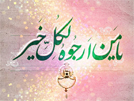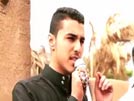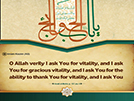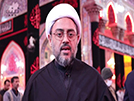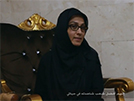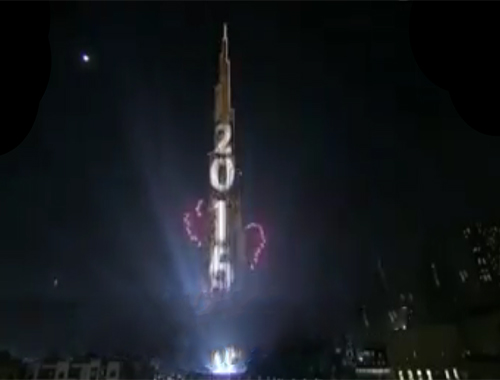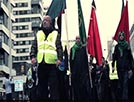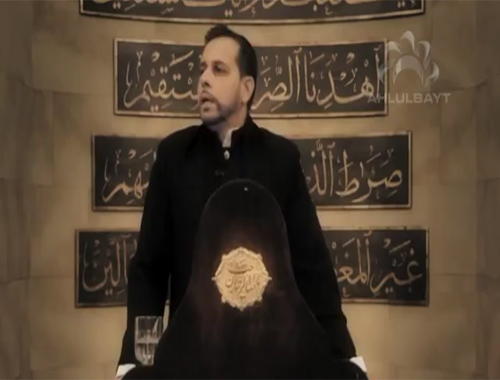Chapter 9
- Details
- Hits: 3909
Chapter 9
--------------------------------------------------------------------------------
Historians and traditionists of both the sects (Shi'ah and Sunni) agree that when the Holy Prophet was to start for the last pilgrimage, he proclaimed far and wide that all the companions should accompany him for pilgrimage. After this proclamation the companions of the Prophet started reaching Medina from all quarters. He had also made it known to the people that those who could not come to Medina, should reach Mecca directly and perform the rites of the pilgrimage with him.
The Prophet left Medina on 25th of Ziq'adah l0th A.H. (Tarikh ibn Alwardi). Innumerable companions started with him from Medina, including Salman, Miqdad, Abuzar and Ammar.
On reaching Mecca he performed the ceremonies of the pilgrimage. All his Ahlul Bayt, wives and companions joined him in the pilgrimage. He delivered a sermon also at the time of Hajj in which he enumerated the bright points of the well-being of his followers and explained the means through which the ummah could get salvation.
Having finished pilgrimage he left Mecca for Medina. At that time with him were (according to Muhaddis Dehlavi) 1, 25,000 or (according to Khawand Shah) 1, 24,000 companions. (Izalatul Khulfa, vol. 1, p. 514 and Rauzatus Safa, vol. 2, p. 215).
When he reached a place called Ghadir Khum with his companions Jibrail brought the Divine message to him, "O My Messenger! Deliver what has been revealed to you from your Lord, and if you do not do it, then you have not delivered His message, (convey my message without fear), and Allah will save you from the mischief of the people". (Surah al-Ma'idah, 5:67)
After this clear command there was no alternative left for him except to convey the message to the people. Accordingly he ordered a pulpit to be raised with the pack-saddles of the camel. After that he said to Bilal of Africa, "O Bilal! Call the people and tell my companions that those who have gone forward should come back and those who have lagged behind must hasten to come forward". Bilal called out, Hayya 'ala Khairil 'amal "Rush for the virtuous act". The crowd gathered round the pulpit of the Prophet. He climbed to the pulpit and after a very long and eloquent sermon called Ali to himself. Then holding the two hands of Ali in his own hands raised him so high that the whiteness of his armpit became completely visible. Then he said, “Whoever considers me to be his master and patron he should consider Ali also to be his master and patron. O Allah! Be the friend of him who is the friend of Ali and be the enemy of him who is the enemy of Ali".
As soon as the people heard it, they raised their supporting voices. The Holy Prophet (s) came down from the pulpit and ordered Ali to accept the congratulations of the companions in a green tent. Accordingly, Ali received the congratulations for the succession of the Holy Prophet (s) and thanked the people for the same. It is written in Ma'arijun Nubuwwah that besides the companions the wives of the Prophet (s) also congratulated Ali for becoming the master and guardian of the Muslim ummah.
According to Tarikh ibn Khalqan the Prophet in his address of Ghadir threw light on the pre-eminence and status of Ali and said that Ali had the same relationship with him as Harun had with Musa. According to Mustadrak, al-Hakim he said, "I leave behind two valuable things amongst you, the Book of Allah and my Ahlul Bayt. You will never go astray if you hold them fast". The same is written in Khasa 'es an-Nisai. According to Rauzatul Ahbab the Holy Prophet also said, "O Allah! Be a friend of one who is a friend of Ali and be an enemy of one who is an enemy of Ali and also turn the truth to the direction which Ali turns his face". It is given in Asbab al-Nuzul, Tafsir Durrul Manthur, Tafsir Fatahul Bayan by Siddiq Hasan, that this verse "Balligh" has been revealed only about Ali. It is written in Sharh Bukhari Aini, Tafsir Ghara'ibul Qur'an of Naishapuri, Tarikh ibnul Wazih, Kanzul 'ummal etc., that the verse "Balligh" has been revealed about the dignity and superiority of Ali.
It is given in Tarikh Abul Fida that after his retum from Ghadir al-Khum, the Holy Prophet (s) fell ill in the last days of Safar, 11 A.H. According to Mishkat Sharif the cause of his illness was the same poison which was given to him in Khaybar and which showed its effect at times. It is given in Tarikh ibn Alwardi that he asked all the companions to go with the army of Usamah bin Zayd and said that he had appointed Usamah the commander of the army.
Muhaddith Dehlavi writes in Madarij that the next day the Holy Prophet in the severity of his illness handed to Usamah a flag of war and asked him to leave and fight the unbelievers for the sake of Allah. Usamah gave that flag to Buraydah ibn Khazib outside the city, and appointed him the standard-bearer of the army. Then starting from Medina he halted at "Jaraf" which is close to Medina till the army gathered. The Prophet (s) had also ordered that except Ali all the "Muhajirin” and "Ansar" must join the army of Usamah and go with him. Some companions became critical that the Holy Prophet had appointed a slave over the high ranking "Muhajirin and Ansar". So they indulged in open criticism about it. When this information reached the Holy Prophet (s) he felt greatly hurt, and in spite of fever came out of the house in a state of extreme displeasure and went upto the pulpit. There he addressed the people, "O people! What are these talks that you are indulged in at Usamah's appointment as the commander of the army, just as you had done at the time of the Battle of Motah when Usamah's father was appointed the army commander. By Allah Usamah deserves command just as his father deserved to be the army commander".
It is in al-Milal wan Nahl by Shahristani and Hujajul Karamah by Siddiq Hasan that the Holy Prophet (s) asked the companions to make immediate preparations for the army of Usamah. Cursed be the man who opposes Usamah's army! According to Madarijun Nubuwwah Abu Bakr and Umar remained behind in Medina and Usamah despatched the army. When he was about to move, his mother informed him that the condition of the Prophet was not satisfactory. She advised him to come back and so he did. According to Tarikhut Tabari in that condition the Prophet called for Ali. ‘Ayesha suggested him to call her father (Abu Bakr) instead, and Hafsa suggested the name of her father (Umar) in place of Ali. In the meantime these people gathered there. But the Prophet said, "You should go back. I will call you myself if I need you at all", Hearing this, those people went away.
In Sahih Muslim it is reported from Ibn Abbas that when the Holy Prophet was about to die on his death bed Umar ibn Khattab and other companions were present in the house of the Prophet. The Holy Prophet said, "Bring me a piece of paper and pen so that I may write something (as my will) for you lest you should be misled after me". Umar said, “The Prophet (s) is saying so because of delirium, we have the Holy Qur'an and that is sufficient for us". At this there arose an altercation among those present there. Some said, "It is obligatory on us to obey his orders so that he may write whatever he likes for us". Some sided with Umar. When there, arose a great noise over this matter, the Prophet said, "Be off from me". It was for this reason that Ibn Abbas used to say, "It was a great tragedy and disaster that the Prophet could not write anything because of the noise and dissension among the people”.
Abdullah ibn Abbas is quoted as saying through the narration of Sa'id bin Jubayr related in Sahih Bukhari, "What a calamitous day was the day of Thursday!" After having said this he wept and then said, "When, on Thursday, the illness of the Prophet (s) grew serious he said, bring me the articles of writing so that I may write for you something by way of my will by which you will not be misled after me", At this people started arguing and disputing. The Prophet said; "It is not proper to quarrel before the Prophet", People said, "The Prophet is speaking in delirium". He said, "Get away from me. I am all right in whatever condition I am. It is wrong whatever you say. Leave me alone. Get away from me". After that the Holy Prophet made his three wills, firstly to turn out all the polytheists from the Arabian Peninsula and secondly to entertain the deputations which came from far off places. The narrator did not narrate the third one or he forgot it".
It is narrated from Sa'id bin Jubayr in Musnad Ahmad bin Hanbal and Sahib Muslim that Abdullah ibn Abbas having said, "What a day it was of Thursday; wept so much that tears rolled down his cheeks like the pearl strings. After that he explained that Thursday was the day when the Holy Prophet said, "Give me the writing articles so that I may write something for you (by way of my will) in order that you may never go astray after me", But, alas! The people said, "He is speaking in delirium".
Shahabuddin Khafaji writes in Nasimur-Riyaz Sharah Shafa Qazi 'Ayaz that according to some versions of this hadith Umar said, "The Prophet is speaking in delirium", Shahristani writes in his book al-Milal wan Nahl that the first dispute and difference that arose during the illness of the Prophet was one which Muhammad Ismail Bukhari has narrated from Abdullah ibn Abbas with his own authorities in his book Sahih Bukhari that when the death disease of the Prophet worsened he said, "Give me the inkpot and paper so that I may write for you a document (by way of testimony) lest you should go astray after me". Hearing this Umar said, "The Prophet is saying so on account of the severity of illness. The Divine Book will do for us". So when there arose a squabble at it the Prophet said, "Get away from me and do not dispute and argue before me". That was the reason why Abdullah ibn Abbas used to say afterwards, "What a great calamity that dispute was! It came in between ourselves and the writing of the Prophet and kept him from writing".
Allamah Shibli No'mani writes, "There is a word of Hajr in the tradition which means delirium. Umar had interpreted the speech of the Holy Prophet as delirium". (Al-Faruq, p.61) In the dictionary the meaning of Hizyan is given as nonsensical talk (Sirat, vol. 2, p. 522).
Nazir Ahmad Dehlavi writes, "Those who were cherishing the hope of Caliphate in their minds turned off the plan through scuffling and justified their opposition by saying that Qur'an was sufficient for them and as the Prophet (s) was not in his senses there was no need to bring the paper and inkpot or else he would dictate irrelevant matters". (Ummahatul ummah, p. 92)
Imam Ghizali writes that before his death the Prophet of Allah asked his companions to bring for him pen, paper and ink so that he might write as to who deserved to be their Imam and Caliph. But at that time Umar asked people to leave that man as he was talking nonsense. (Sirrul 'Alamin, Sharah Muslim, Navai, vol. 2)
In short, when the Prophet was not given pen and ink there arose a row among those who were present there. My historical inference says that at that time Abuzar, Salman, Miqdad and Ibn Abbas etc. opposed the refusal and the ladies admonished them from behind the curtain, "What has happened to you? Why don't you listen to what the Holy Prophet says? For Allah's sake give him what he wants". Hearing this Umar said "Keep quiet! You are like the ladies of Yusuf. You weep during the Prophet's illness and get on his nerves when he is healthy". When his voice reached the ears of the Prophet he said, "Do not scold them as they are better than you". (Tabrani)
According to Rauzatul Ahbab the Prophet at the time of his death asked his daughter Fatimah Zahra to call her sons. She brought them to him. The two grandsons after paying respect to the grandfather set by his side and finding him in the agony of the illness wept so bitterly that those who saw them also began weeping. Hasan put his face on the face of the Prophet and Husayn put his head upon his chest. He opened his eyes and looking at them affectionately caressed them with love, and expressed his wish to the people to respect and reverence them. There is also a tradition that hearing Hasnain weep, all those present there started crying and hearing them the Prophet also began weeping. Then he sent for his dear brother, Ali came and took his seat towards the head of the Prophet. When he raised his head, Ali, coming to his side, placed the Prophet's head up on his arm. The Prophet said, “Ali! I have borrowed this much loan from a certain Jew for the equipment of the army of Usamah. Pay him back the same. O Ali! You will be the first to come to me at the Cistern of Kauthar, and you will suffer great troubles after me. Face them with patience and when you see that the people have chosen the world you should care for the hereafter". (Madarijun Nubuwwah, vol. 2, and Tarikhul Baghdad, vol. 11)
It is also recorded in Madarijun Nubuwwah that Fatimah Zahra was extremely shocked at the death of the Prophet and wept bitterly and excessively with painful cries. Muhaddith Dehlavi writes in the book "Mathabata bis Sunnah" that many tragic events happened to her after the death of the Prophet. She has mentioned them in a couplet saying that if the hardships which she had to face, had befallen the day, it would have turned into dark night. The writer of Rauzatul Ahbab says that after the demise of the Prophet nobody saw her laughing.
Tabaqat ibn Sa'd writes that the Prophet's head was in Ali's lap at the time of his death. Hakim says in Mustadrak that the Prophet before breathing his last passed on secrets to Ali and solved mysteries for him.
Abdul Barr in his book Isti'ab quotes Abdullah ibn Abbas as saying, “Ali possesses four such distinctions as none of us has. Firstly, Ali was the first person to have earned the honour of offering prayers with the Holy Prophet. Secondly, he was the only standard bearer of the Prophet in every battle. Thirdly, when in the holy wars people fled away leaving the Prophet behind, Ali remained steadfast in the company of the Prophet. Fourthly, Ali is that person who gave funeral bath to the Prophet and laid him into the grave".
According to Shi 'ah Muslim belief, the Holy Prophet died on Monday, the 28th of Safar, 11 A.H. (Ma waddatul Qurba, p. 49 printed Bombay 1310 A.H.). Following his death there were lamentations and wailings among the members of his household and his revered companions. Abuzar, Salman, Miqdad, Ammar, and other sincere companions were crying their hearts out. In short he was like a sincere friend beside himself with sorrow. History shows that Abuzar Ghifari had a lasting impression of this tragedy. Manazir Ahsan Gilani writes, "In most descriptions of Abuzar's life, though clear signs are found of that pain without which a believer is not a believer, yet there are some inspiring events which present a beautiful portrait of the mutual relationship of the lover and the beloved before our mind's eye". (al-Ishteraki az-Zahid p. 90)
At the time of the death of the Holy Prophet Abu Bakr was at his home at Sakh, at a distance of one mile from Medina. Umar prevented the death news from being publicized and when Abu Bakr arrived both of them went to Saqifah Bani Sa'dah which was at a distance of three miles from Medina, and with them went Abu Ubaydah bin Jarrah as well who was a washer by profession. Anyhow, the chief companions of the Prophet went to join the dispute of Caliphate leaving his dead body behind, and Ali arranged and managed the affairs of the Prophet's bath and burial. Ali did the washing, Fazl ibn Abbas kept his skirt raised, Abbas and Qathm turned his sides and Usamah and Shaqran poured water. After washing he was enshrouded. Abu Talha dug the grave. Ali led the funeral prayer and it was he who got down into the grave and lowered the corpse in it. After that he covered the grave with earth with great lamentation. Abu Bakr and Umar etc. could not join the washing, enshrouding and the funeral prayer of the Holy Prophet; because when they came back from Saqifah the Prophet had already been buried. (Kanzul Ummal, vol. 3 p. 140 Arjahul Matalib, p. 670, Fatahul Bari, vol. 6, p. 4) The Holy Prophet was 63 at the time of his death. (Abul Fida, vol. 1 p. 152)

